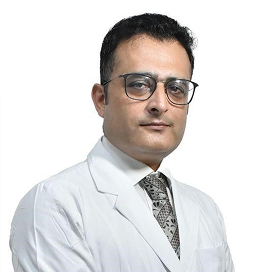What is Liver Cirrhosis?
Liver cirrhosis is a chronic disease characterized by severe scarring of the liver, where healthy liver tissue is replaced by scar tissue. This deterioration often results from various liver diseases and conditions, leading to significant impairment of liver function. It's important to note that cirrhosis is irreversible and can progress to life-threatening situations like liver failure..
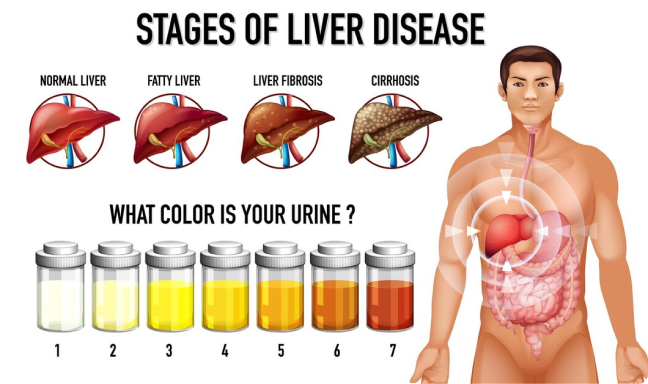
Causes and Complications:
Several factors contribute to liver cirrhosis, including chronic alcohol consumption, viral hepatitis, fatty liver disease, and autoimmune diseases. The major complications arising from cirrhosis can be devastating and include:
-
Portal Hypertension: Increased blood pressure in the portal venous system, which can lead to varices (enlarged veins) and bleeding.
-
Ascites: Accumulation of fluid in the abdominal cavity.
-
Hepatic Encephalopathy: A decline in brain function due to the liver's inability to remove toxins from the blood.
-
Infections: atients are at higher risk of infections due to liver malfunction.
-
Liver Cancer: There is an increased risk of hepatocellular carcinoma (primary liver cancer) in individuals with cirrhosis.
-
Liver Failure: The ultimate complication where the liver ceases to function effectively.
Treatment Options
While there is no cure for liver cirrhosis, various treatments can help manage symptoms and improve quality of life. Treatment strategies may include:
-
Medications: To manage symptoms and prevent complications (e.g., diuretics for ascites, beta-blockers for portal hypertension).
-
Lifestyle Changes:Such as a low-sodium diet, abstaining from alcohol, and maintaining a healthy weight.
-
Regular Monitoring:Routine tests to track liver function and detect complications early.
-
Liver Transplant: In severe cases of liver failure, a transplant may be the only option.
Treatment Costs in India:
The cost of treating liver cirrhosis in India varies significantly based on the treatment required. On average, the treatment can begin at around 1000$ and may escalate to 12,000$ to 15,000$ for more severe cases, including liver transplants.
For a liver transplant, the total expenses can reach approximately 23,000$-30000$, covering pre and post-surgery costs, hospitalization, and medications. This places India among the more economical choices for liver treatment compared to many Western countries, making it a hotspot for medical tourism.
Conclusion:
Liver cirrhosis is a serious condition that requires proper management and care. Understanding the complexities of treatment and costs involved is essential for patients and their families in making informed decisions. Early diagnosis and timely intervention can significantly improve outcomes and quality of life. Universelle Medicaid can help you with making all the necessary arrangements for your medical treatment, starting from the time you leave your home till you finish your treatment and get back all well to your country. Follow up consultations will also be provided post treatment procedure via online consultation.
Frequently Asked Questions(FAQ's)
- Swollen ankles and feet
- Abdominal water retention
- Extreme fatigue impacting daily life
- Black stools and vomiting (indicating acute liver disease)
- They should be aged 18 to 55
- Their blood group must match
- They should not be obese or suffer from other health issues
- A hospital stay of 7-10 days is required
- Patients can return to normal activities within three months
- Donors usually take medications for 2-3 weeks post-surgery
- Donors can resume a normal lifestyle within one month
- Heavy exercises can be performed after three months without restrictions
- Prevent infections
- Control bleeding
Long-term medication may be required, although dosages typically decrease over time.
Important Notes
-
Prices are subject to change or withdrawal without notice.
-
These prices are indicative and may vary depending on the patient's condition at the time of admission.
-
A final estimate will be provided upon the patient’s admission.
TREATMENTS
Liver Treatment Surgery

Liver transplant
Liver transplant in India is currently experiencing a significant period of...
More Information
Liver Cancer Treatment
Tympanoplasty surgery is a procedure that repairs holes in the...
More Information
Liver transplant
Liver transplant in India is currently experiencing a significant period of...
More Information
Liver Cancer Treatment
Tympanoplasty surgery is a procedure that repairs holes in the...
More InformationDoctors
Our Specialist Doctors

Dr. Shashank Chaudhary
Surgical Oncology, Cancer Care



Dr. Vijayant Devenraj
Cardiac Surgery (CTVS), Thoracic



Dr. PrasoonKant Shamshery
Orthopaedics & Joint Replacement



Dr. Vikas Singla
Senior Director & Head – Gastroenterology (Pancreatic-Biliary, Luminal Gastroenterology & Endoscopy Division)



Dr. Anita Sethi
Principal Director & HOD - Ophthalmology (Max Panchsheel & Max Saket)


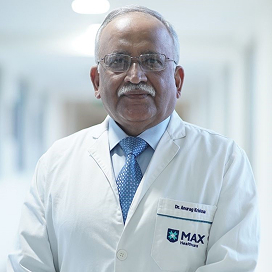
Dr. Anurag Krishna
Chairman - Paediatrics & Paediatric Surgery Paediatric (Ped) Surgery, Paediatric (Ped) Urology



Dr. Bipin Walia
Vice Chairman & Head- Neurosurgery for Max Saket Complex & Vice Chairman- Neurospine, Max Saket


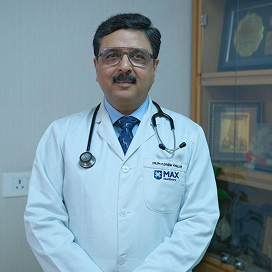
Dr. Dinesh Khullar
Chairman - Nephrology & Renal Transplant Medicine, Max Saket Complex


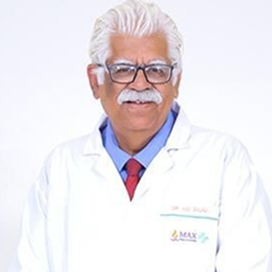
Dr. H.N. Bajaj
Principal Director (Orthopaedics) & Head (Spine Surgery) Orthopaedics & Joint Replacement, Spine Surgery, Arthroscopy & Sports Injury



Dr. Harit Chaturvedi
Chairman - Max Institute of Cancer Care Cancer Care / Oncology, Thoracic Oncology, Surgical Oncology, Robotic Surgery, Head & Neck Oncology, Breast Cancer



Dr. Kulbhushan Singh Dagar
Principal Director, Chief Surgeon & Head - Neonatal & Congenital Heart Surgery Paediatric (Ped) Cardiac Surgery, Cardiac Sciences, Paediatrics (Ped)



Dr. Pradeep Chowbey
Chairman - Max Institute of Laparoscopic, Endoscopic, Bariatric Surgery & Allied Surgical Specialities



Dr. Sunil Choudhary
Principal Director & Chief of Plastic Surgery (Max Institute of Reconstructive, Aesthetic, Cleft & Craniofacial Surgery (Miracles) Aesthetic And Reconstructive Surgery



Dr. Abhishek Mishra
MBBS, MS - Orthopaedics Orthopedic surgeon, Joint Replacement Surgeon



Dr. Vineet Malhotra
MBBS | MS – General Surgery | DNB – Urology/Genito – Urinary Surgery



Dr. (Lt Col) Ashok Kumar
Senior Consultant & Head - Radiation Oncology



Dr. Aman Jyoti
Senior Consultant – Paediatrics Cardiac Anaesthesia & Cardiac Intensive Care



Dr. Amit Kumar
Associate Director & Head (Unit I) - Interventional Cardiology



Dr. Anushtup De
Senior Consultant & Head (Unit l) - General & Minimally Invasive Surgery



Dr. Arjun Goel
Senior Consultant & Head (Unit II)- General & Minimally Invasive Surgery



Dr. Dinesh Pendharkar
HOD & Director - Medical Oncology, Cancer Care, Haematology & BMT



Dr. Subhash Hakoo
HOD & Director - General & Minimally Invasive Surgery



Dr. Sujoy Bhattacharjee
HOD & Director - Robotic Joint Replacement



Dr. Tanmay Pandya
HOD & Director - Nephrology & Renal Transplantation



Dr. Ved Prakash
Senior Consultant & Head - Cardiothoracic & Vascular Surgery



Dr. Anuj Agrawal
Sr. Consultant Department of Orthopaedics & Joint Replacement



Dr. Ashwini Kumar Singh
Senior Consultant & Head Plastic, Reconstructive & Cosmetic Surgery



Dr. Nikhil Gupta
Orthopaedics, Arthroscopy & Joint Replacement Surgery



Dr. Sparshi Jain
Consultant in Department of Ophthalmology



Dr. (Maj) Ravi Shankar
Consultant - Haemato-Oncology & BMT MBBS, MD (Pediatrics) Fellowship PHO & BMT



Dr. Amrita Tiwary Vyas
Consultant, Neurosciences/Neurosurgery, Brain & Spine Specialist



Dr. Ankit Agrawal
Consultant, Neurosciences/Neurosurgery, Brain & Spine Specialist



Dr. Sudhir Sharma
Director - Minimal Access, Robotic, Bariatric and General Surgery, MBBS, MS, MBA, FIAGES, FICLS



Dr. Sujoy Bhattacharjee
HOD & Director - Robotic Joint Replacement


Book Appointment
Complete the form below to schedule your appointment.
Begin Your Health Treatment Journey with Us
By utilizing our services, you'll find it easier to improve your well-being and feel better."
Consult Now













